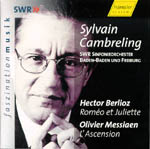Sylvain Cambreling offers up a rhythmically slack, emotionally neutered Romeo and Juliet, denying Berlioz’s highly original yet sprawling masterpiece the crisp articulation, pointed accents, and taut rhythms it needs to make its impact. Instead, the conductor prefers to rely on the score’s beautiful colors, of which there are many. But other conductors–Colin Davis with the London Symphony and Vienna Philharmonic, Riccardo Muti with Philadelphia, and most especially Charles Munch with the Boston Symphony–miraculously fuse beauty to dramatic impact.
Cambreling’s introduction sets the tone for his entire performance: the strings are swift but don’t crackle as they should, and the brass lack that bold (some would say rude) Berliozian quality (they really wimp out in Romeo at the Vault of the Capulets, where Muti has you almost jumping out of your seat). The choral singing is sweet-toned (as is mezzo Nadine Denize’s solo work) but not particularly ardent. Tenor Piotr Beczala takes a good crack at his role, but Bass Peter Lika varies from assured singing to precarious wobbling–not exactly a Friar that could calm a blood-thirsty crowd.
If you are not convinced by this music, Cambreling’s performance won’t help your situation. On the other hand, he’s thoroughly successful in realizing the exotic and mystical states evoked by Messiaen’s L’Ascension, reveling as he does in its captivating sonorities and astringent edges. Perhaps Cambreling should stick to this composer’s music, for it clearly caters to his strengths more than Berlioz. Hänssler once again provides big, full detailed sound.
































